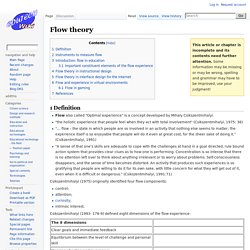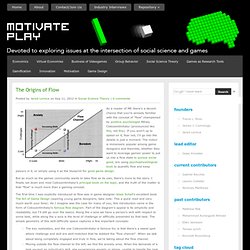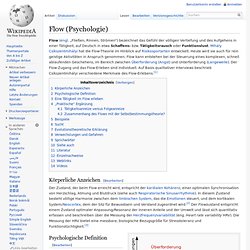

Flow theory. This article or chapter is incomplete and its contents need further attention.

Some information may be missing or may be wrong, spelling and grammar may have to be improved, use your judgment! 1 Definition Flow also called "Optimal experience" is a concept developed by Mihaly Csikszentmihalyi. "the holistic experience that people feel when they act with total involvement" (Csikszentmihalyi, 1975: 36) “… flow – the state in which people are so involved in an activity that nothing else seems to matter; the experience itself is so enjoyable that people will do it even at great cost, for the sheer sake of doing it.”
(Csikzentmihalyi, 1991) "A sense of that one’s skills are adequate to cope with the challenges at hand in a goal directed, rule bound action system that provides clear clues as to how one is performing. Csikszentmihalyi (1975) originally identified four flow components: control; attention; curiosity; intrinsic interest. 2 Instruments to measure flow Lloyd P.
Under construction ! Mihaly Csikszentmihalyi: Flow, the secret to happiness. The Origins of Flow. As a reader of MP, there's a decent chance that you're already familiar with the concept of "flow" championed by positive psychologist Mihaly Csikszentmihalyi (pronounced like this, not this).

If you aren't up to speed on it, fear not; I'll go into the details in just a moment. The notion is immensely popular among game designers and theorists, whether they want to leverage games' power to put us into a flow state to pursue social good, are using psychophysiological tools to quantify flow and keep players in it, or simply using it as the blueprint for good game design. But as much as the games community wants to take flow as its own, there's more to the story. I finally sat down and read Csikszentmihalyi's principal book on the topic, and the truth of the matter is that "flow" is much more than a gaming concept. The key realization, and the one Csikszentmihalyi is famous for, is that there's a sweet spot where challenge and skill are well-matched that he dubbed the "flow channel".
Flow (Psychologie) Der Psychologe Mihály Csíkszentmihályi definiert den Flow wie folgt: b.

Die Tätigkeit hat ihre Zielsetzung bei sich selbst (sie ist autotelisch) a. Unsere Sorgen um uns selbst verschwinden. Flow kann als Zustand beschrieben werden, in dem Aufmerksamkeit, Motivation und die Umgebung in einer Art produktiven Harmonie zusammentreffen. Durch das Eintreten in eine solche Phase entsteht eine Selbst- und Zeitvergessenheit, da die Aufgabe ganze Aufmerksamkeit erfordert. Das Bemalen des Modellbootes geht wie von selbst. Einige Ergänzungen kommen teilweise aus der Gedächtnispsychologie, Sozialpsychologie, Motivationspsychologie und stellen letztendlich eine Art Informationsverarbeitungsansatz dar.
Weshalb vergessen Menschen im Flow die Zeit? Eine Person, die nun weiß, „was“ und „wie“ sie etwas zu tun hat (Ziel- und Handlungsklarheit) und deren Fähigkeiten den Anforderungen der Tätigkeit gerecht werden, kann sich ganz auf das Ausführen der Tätigkeit einlassen, also in der Tätigkeit aufgehen. Flow & Usability. Momente des Glücks. Flow (psychology) Concentrating on a task is one aspect of flow.

In positive psychology, flow, also known colloquially as being in the zone, is the mental state of operation in which a person performing an activity is fully immersed in a feeling of energized focus, full involvement, and enjoyment in the process of the activity. In essence, flow is characterized by complete absorption in what one does, and a resulting loss in one's sense of space and time. Flow shares many characteristics with hyperfocus. However, hyperfocus is not always described in a positive light.
Some examples include spending "too much" time playing video games or getting side-tracked and pleasurably absorbed by one aspect of an assignment or task to the detriment of the overall assignment. Just as with the conditions listed above, these conditions can be independent of one another. Ideas similar to flow have been recognized throughout history and across cultures. Schaffer (2013) proposed 7 flow conditions: Further, he writes: Notes. Flow Theory - Kay McMahon's research website.